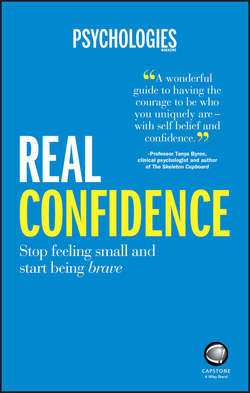Читать книгу Real Confidence - Magazine Psychologies - Страница 7
На сайте Литреса книга снята с продажи.
1
HOW CONFIDENT ARE YOU?
CHAPTER 1
DEFINING CONFIDENCE – IS IT WHAT YOU THINK IT IS?
CONFIDENCE MEANS HAVING A GO
ОглавлениеOne of the problems with defining confidence is that the psychologists themselves haven’t researched this much. Most of the research is somewhere between self-esteem and self-efficacy. Self-efficacy is a concept that first emerged in the 1970s through Canadian psychologist Albert Bandura3 and has been researched extensively.
“ Self-esteem is more about liking yourself. Self-efficacy is our belief in our capacity to try and accomplish something. ”
Dr Ilona Boniwell, positive psychologist
If you don’t like yourself it’s not easy to change this. If you don’t like a part of yourself, it’s not easy to change this. Let’s say you don’t like your body. You might very well find the idea of going to a gym intimidating because you picture that it will be full of people perfecting their six-packs and toned bodies. But you might decide to give running a try because you live near a splendid park and were pretty good at running at school. You discover it clears your head after work, you get fit and then proudly notice your body looking better.
Bandura’s definition of self-efficacy in simple terms means: ‘I can have a go. I’m hopeless at exercise, I’ve been a couch potato for years, but I was good at running at school, so I might like it again. I can give it a try and see how I get on.’ What this shows is that confidence is a skill that can be learnt, as long as we simply try.
“ I can have a go is not a guarantee of a positive outcome, but it’s a positive feeling that you are able to try. ”
Dr Ilona Boniwell, positive psychologist
What Boniwell highlights is that there’s confusion and misrepresentation in our society as to what confidence actually is. People with inflated self-esteem might have real confidence, but they might not. While self-esteem applies to our character in general, self-efficacy is what explains why we can be confident in one area of our lives and not in another.
DR ILONA BONIWELL ON DEVELOPING CONFIDENCE IN DIFFERENT AREAS
Boniwell, a highly qualified academic and accomplished professional, remembers being confident at school from the start. ‘Very early on I was confident reading poems in front of hundreds of pupils. I was always confident with teachers.’ But as the tallest girl (she was her adult height at the age of 12) she had to contend with all the other children at school making fun of her. When her family moved from Latvia to Saransk, Russia, she was the tallest female in a city of 300,000 people. ‘I was called giraffe. And Eiffel Tower.’
As a result of her height she wasn’t confident with boys. For a start she had to wait for them to catch up with her height. By the time she was 19 her confidence began to develop but she admits it wasn’t until her late 20s that she got over this. Her personal experience underlines her views on confidence: ‘We can be confident in one thing and not another. And we can develop confidence in areas where we lack confidence. That was the case with me.’
Looking at definitions of confidence and delving into what it means as a word and an academic term in psychology, as well as in actual living terms, immediately makes it more accessible. Self-esteem might be a part of confidence, but it’s by no means the only part. That’s great news because changing self-esteem is much harder work, but by developing confidence, your self-esteem will increase too. Reading this book shows that you are willing to give something new a go and you’re prepared to try advice offered to you – and this willingness to try is a crucial part of confidence.
Of course, when we think of confidence we tend to think of a certain stand-out quality. Confident people shine, don’t they?
